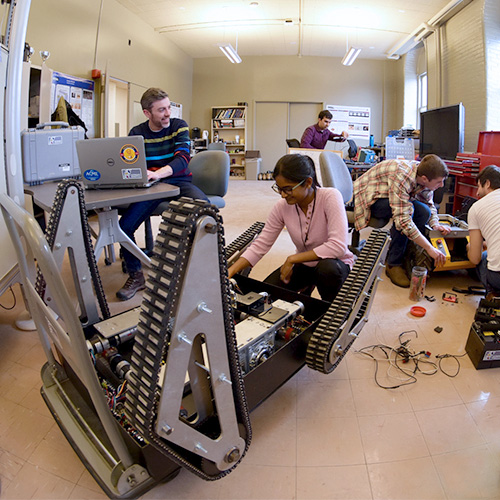The Biomedical and Intelligent Systems Group in the Department of Electrical and Computer Engineering utilizes state-of-the-art robotic, imaging, and sensory systems as well as a wide array of technological advancements in signal processing, controls, machine learning, and analytics to lead innovative research in the areas of intelligent and autonomous systems, and biomedicine and biomedical engineering.
Their research in intelligent and autonomous systems focuses on the application of discrete event systems for the autonomous control of multi-agent systems; computer vision for object recognition, pose determination, tracking of free-flying satellites in space, and for automated analyses of urban scenes; aerial robots, vision-based navigation, safe learning-based control; autonomous and semi-autonomous navigation of off-road and urban vehicles (see Figure 1); human-robot interaction; AR/VR; human-augmentative technologies, and ambient sensing and smart environments for safe driving and the development of energy-efficient buildings.

The group’s research in biomedicine and biomedical engineering includes: machine learning and modelling techniques using big data for predicting treatment response, clinical outcome, and cancer survival; the use of robotic technology for the tele-rehabilitation of stroke patients; haptics; robotic medical simulators for competency-based training; and the use of biosensory signals to study body posture for load analysis and human performance. With the advent of fast computing and inexpensive hardware technologies, the group is poised to further its research in applied intelligent machines, human sensing, and assistive technologies.
The research excellence of the group has been recognized at the national and international levels. Members include a fellow of the Institute of Electrical and Electronics Engineers (IEEE), an associate editor of IEEE Transactions on Haptics, and a registered IEEE distinguished lecturer. Researchers have also served on major granting program committees, such as the Natural Sciences and Engineering Research Council of Canada’s (NSERC) Discovery Grants Program. They have also organized prominent conferences, including the Artificial Intelligence/ Graphics Interface/Computer and Robot Vision Conference (AI-GI-CRV), the International Conference on Intelligent Robots and Systems (IROS), and the Robotics and Control Symposium of the IEEE Canadian Conference on Electrical and Computer Engineering (CCECE).